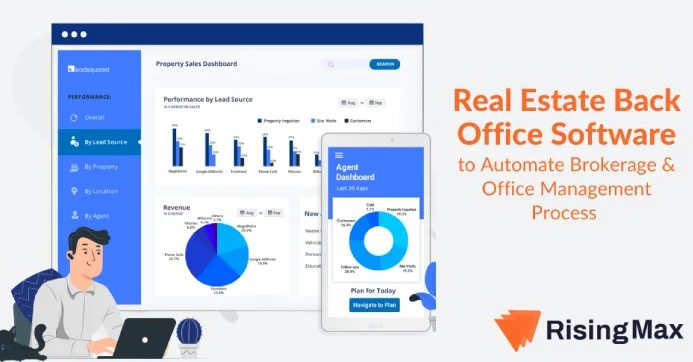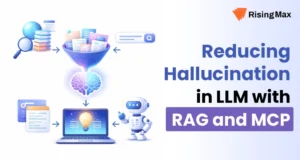The way of handling real estate business processes has significantly changed nowadays. It’s no more hard to imagine real estate professionals struggling to manage their back office.
All specific work functions are more convenient than ever to execute. All thanks to the latest advancements in technology and real estate brokerage back office software helping businesses step up the game.
With optimized solutions that host a set of tools, the execution of back-office functions, including production, inventory, and billing, is much faster. A good number of tools are now there to manage back-office functions and assist in optimizing resource usage to help obtain optimal productivity.
All the latest tools inside the real estate back office software are changing the way real estate offices and teams perform.
No matter what real estate business you’re in these days, the technology you utilize will affect efficiency and profit. As new technologies and techniques have been introduced into the market, real estate transactions have improved in terms of ease. Property managers are now taking steps towards adopting services like custom software development in NYC to build robust software ensuring better tracking of properties, buildings, and daily operations.
The development of real estate back office software is the best and most efficient way to manage the back office. While it takes care of all of your everyday activities, you can focus your efforts on more important tasks that require your time and expertise. There’s a lot of it out there, and there’s still a long way to go. Property managers and businesses should expect some changes soon.
What Is Back Office Real Estate Management Software?
Back Real Estate office management software is a platform built from the ground up to help handle your company’s back office operations. It is a solution for residential real estate brokerages that have to handle all aspects of accounting, compliance, marketing, etc. All virtual teams in your firm, including Human Resources, Finance, Operations, and Administration, can benefit from the real estate back office software.
Management in the back office vs. management in the front office
Front office activities include everything connected to creating marketing materials, social media pages, advertisements for customer relationship management, and promoting products and services, etc. Whereas, back-office duties are the ones that are considered as front office tasks and are expected to be completed efficiently. Even a single error will have an immediate impact on the company’s front-office efficiency.
Different Departments Where Back Office Management Software Helps
Finance/Accounting: An organization’s financial team can use software to track expenses, audit them, manage taxes, and disburse funds. To streamline and integrate them all, you’ll need real estate back office software. This will allow your personnel to work to their maximum capacity.
Human Resource Management: Payroll can be managed using various ERP solutions, which the HR department can pick from. There is no need to utilize different software packages; instead, a single solution, like a payroll system can assist streamline HR tasks.
Automation of Project Management: In the current age of the internet, customers and vendors are expected to make online project management necessary. You can make it easier for team members to collaborate, set goals, and automate when possible to save valuable manpower by incorporating software into your workflow procedures.
Even though back office real estate software has a plethora of features and capabilities, and its benefits aren’t appear to be limitless, here is a compiled list:
Maintenance Request Tracking: Many real estate back office software packages include the ability to track maintenance requests. These requests, however, must be monitored at the time of the transaction. This indicates that every transaction made during the year will result in tax liability at the end of the year.
The year closure will be messed up if the operations are not adequately tracked from the beginning. On the other hand, keeping track of maintenance requests and managing them via software will become more accessible and more balanced, ensuring a seamless year.
Sales Management: As previously stated, real estate back office software keeps track of all interactions with customers. CRM systems make it possible to predict transaction volume, close deals, log offers, highlight listings, and, in general, track pipeline at each stage of the sales cycle.
CRM software reporting capabilities can assist in determining likely causes, such as the average price of current listings or the average time a property spends on the market. As a result, CRM technologies are required to keep your sales pipeline flowing smoothly.
Payment Engagement: Getting involved in payments is a significant job, and keeping track of each is even more difficult. Many businesses continue to rely on paper checks from time to time. Real estate back office management software is designed in such a way that automatic fees and payment collection will be handled entirely in the front end.
Tenants and service professionals will be able to engage a system that makes things easier i.e. futuristic real estate management software. As a result, you can save time and effort, allowing you to be more productive.
Account Management: When managing numerous properties, the most critical pain factor is having to do all of the activities and accounting on your own. In such cases, real estate back office management software comes in handy. Property managers’ and landlords’ productivity is not hampered. It maintains track of the services provided and the costs associated with those services.
You won’t have to keep track of every accounting receipt you receive. All of this is taken care of by the software. With the help of software, you can keep track of the invoices, receipts, and maintenance requests, among other things. Many of those property management companies will be affected by these aspects.

Top Features To Look For In Real Estate Back Office Management Software
The Following Features Must Be Included In Back-office Software:
Scalability: The software must be so versatile that any department in the back office can use it. You can begin utilizing this program in a single back-office department, but in the future, you must be able to integrate the same software and database into the activities of another department.
Unified Working Landscape: Everyone can utilize a single piece of software, so your staff from various departments could learn together in centralized sessions. A single database means that once data is entered into the software, it will remain indefinitely accessible to everyone who has permission to use it.
Robust Security System: Advanced security settings should be available in real estate back office software, ensuring that confidential information is only accessible to the persons you choose. There are no excuses – a single piece of information in the wrong hands can lead to a company’s worse.
Usability: The ease with which it can be used. The software should be easy to use. It should have a user-friendly interface that works in the user’s preferred environment — in their browser or on their iPhone.
Here Are Some More Real Estate Management System Types:
A real estate back office software is critical for any sort of property since it allows you to manage multiple real estate assets, automate repetitive business operations, and save all of your data in one location.
Residential Property Management Systems: Owners of apartment complexes, residences, single-family homes, and multi-unit properties who rent for the short or long term should use this type of management system. Owners can use the residential property management software to:
- Leases can be signed online
- Keep track of multiple leases
- Collect rent payments over the internet
- Property inspection files should be organized for maintenance chores.
- Property accounting should be managed.
Commercial Property Management Systems: Commercial real estate back office management software is used by owners of office buildings and retail locations to:
- Decrease property maintenance wait times
- Collect data on leases from various contractors
- Collect rent payments over the internet
- Personalize your online reporting
Condo Management System: Condominiums can benefit from powerful Condo management software. The following are some of the features of these property management systems:
- E-payments
- Accounting
- Reporting
Industrial Property Management Systems: Offices, warehouses, logistics facilities, and industrial sites all employ this type of property management system. The primary purpose of Industrial property management systems is to:
- Management of facility upkeep
- Space management and lease administration
Ways to Create a Real Estate Back Office Management Software
Custom Development
Custom development refers to the process of creating a property management system from the ground up. Real estate back office management Software are typically required for people who deal with difficulties such as property management or multiple properties on a daily basis.
Why Build a Property Management System with Custom Development?
- Everything will be adapted to your company’s specific requirements.
- Any functionality that you desire can be implemented.
- You can rely on high-quality real estate back office software that is simple to integrate with APIs and other applications.
- Ability to add new features and expand the system at any moment
- Your target audience will benefit from a custom UX created just for them.
SaaS-Based Solutions
Software as a Service that offers pre-built software for rental property administration. To get access to it, all you have to do is pay a monthly subscription price. These ready-made solutions are ideal for people who are just getting started in the real estate industry and do not require a personalized approach or the management of a large number of properties.
Why Should You Use SaaS to Create a Property Management System?
- Prices are moderate and not much higher.
- It takes very little time to get started with a SaaS service.
A Few Simple Steps To Creating A Next-generation Real Estate Back Office Management Software
Whether the need is for real estate auction software or a system to manage back-office processes, having a top software development company in place is a wise decision. Find out the technology partner that understands your business requirements with the capability to generate significant ROI for your business. If you decide to design a custom solution, there are a few steps to consider:
Define the goal: Consider the ideal solution you wish to design. In terms of its must-have features, consider whether it will be available on mobile or desktop.
Market research: Examine the market and the competitors. Determine your target market, investigate their issues, and provide solutions for your product.
Create your MVP: Create a minimum viable product with simple functions and a stunning design that can be tested by a small group of people. Gather their input and make modifications as needed.
Use AI, big data, business intelligence, and Blockchain in the development process: Pattern detection, data analysis, and security enhancement are all made easier with AI. You will be able to cut maintenance expenses and develop a predictive analysis by utilizing big data.
Testing & launching:
- Test your software before the official release. This will work in the prevention of errors.
- Optimize it for different types and sizes of mobile devices, as well as various web browsers.
- If everything looks good, go ahead and launch it!
- To build a client base and establish market recognition, use a marketing strategy.
What’s The Cost of Building Real Estate Back Office Management Software?
Several factors determine the average cost of a custom real estate back office management software. Size, categories, development difficulty, functionality, features, and, most importantly, your budget are all factors to consider. Another factor that affects development costs is whether you construct it in-house or hire a software development firm to do it for you.
Conclusion
Back office real estate software can be divided into several programs for communication, document uploading, and etc. An all-in-one software product is a more preferred solution created for accounting, payroll, or time management.
In contrast, it can provide your office with all of the essential requirements and a few advanced features to reroute your workforce’s efficiency in the proper way. From bringing data together to make decision-making easier, notifying managers of pending approvals, to providing an easier way to audit invoices, making it the ultimate back office management software you’ll ever need.
RisingMax is amongst the leading providers of real estate listing management software solutions and IT consulting companies in New York. We are your go-to solution if you want to move faster towards the future of mobility. Let’s discuss your business!














